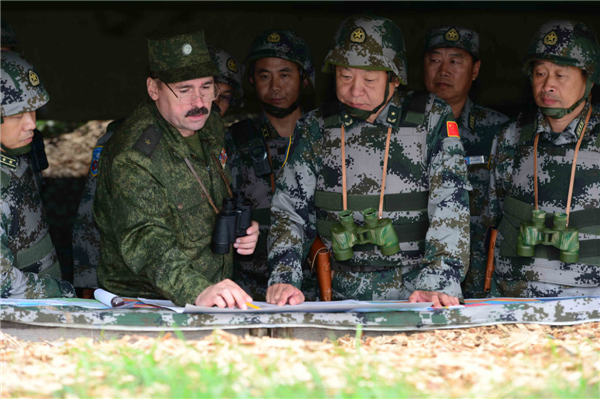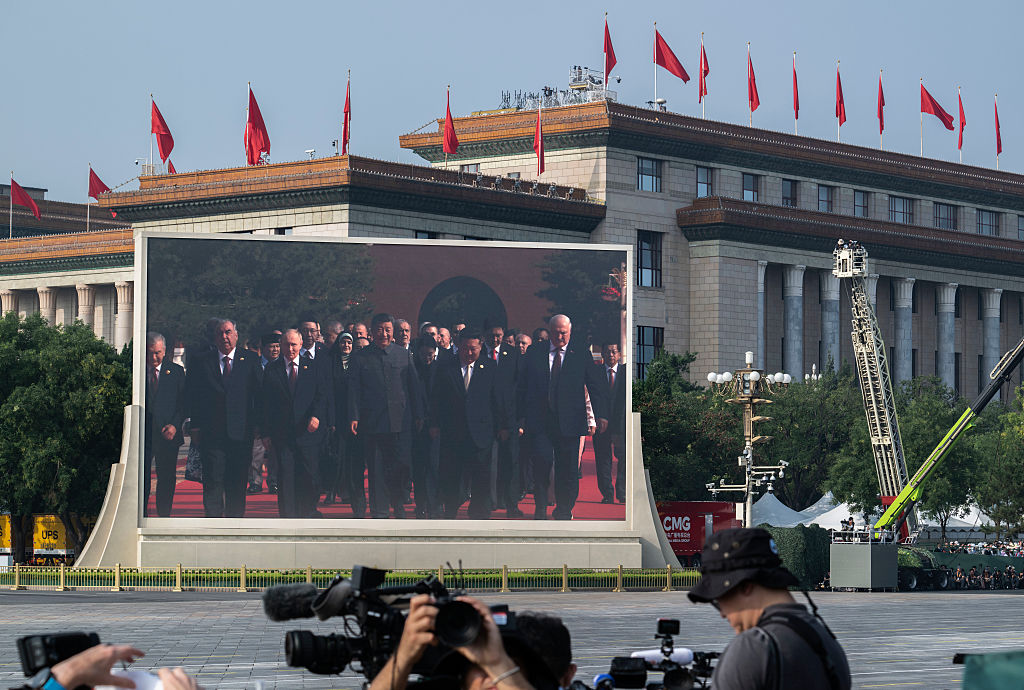
China and Russia: Shackled to a Corpse?
China and Russia: Shackled to a Corpse?
Almost as soon as Russian tanks began their bloody crawl toward Kyiv, debate ensued over whether Chinese leaders had advance knowledge of the Kremlin’s war plans. The broader Chinese foreign policy community was certainly dumbstruck as U.S. warnings of an imminent Russian attack on Ukraine were discounted as geopolitical ploys (Global Times, February 18; Stimson, February 28). However, given the highly personalized nature of the Sino-Russian strategic partnership— President Xi Jinping has met with his counterpart Vladimir Putin 38 times since 2013 — the top leadership was assuredly not entirely in the dark (FMPRC, December 15, 2021). As competition with the U.S. has intensified under Xi, Russia has consolidated its position as China’s most consequential strategic partner. However, China is increasingly concerned that Putin’s war and the resultant international backlash are severely damaging Russia. Some elites have also condemned Russia’s brutality and unilateral aggression, which underscores mounting anxiety that China is tied to a partner that is both weaker and more belligerent than it had previously realized (China Times, March 1). In the current situation, Xi comes off poorly regardless of how much foreknowledge he possessed. If he was naïve about Putin’s designs, he looks weak for allowing a lesser partner to drag China into a confrontation with the West. If Xi cut Putin a blank check for aggression, this may intensify muted but pointed domestic criticism of his foreign policy acumen including his decision to privilege ties with Russia over relations with the West, which are more integral to China’s economic and technological development.
As Russian troops massed on Ukraine’s borders in early February, Xi emboldened Putin by elevating the already close Sino-Russian partnership. At their pre-Olympic summit, both leaders signed a Joint Statement, which offers a blueprint for deepening bilateral cooperation in a “new era” of international relations, while also reaffirming mutual support for one another’s “core interests” (President of Russia, February 4). On Monday, Foreign Minister Wang Yi said Russia is China’s “most important close neighbor and strategic partner” and averred that both sides will “steadily advance our comprehensive strategic partnership of coordination for a new era” (People’s Daily, March 7. 2022). Beijing’s reaffirmation of the Sino-Russian partnership during Russia’s assault on Ukraine, reflects Xi’s view that the partnership remains essential. Consequently, China will hang tough with Russia, but due to mounting anxiety over its primary strategic partner’s vulnerability, Beijing is also keeping diplomatic avenues open that might provide Putin with a face-saving off-ramp. Such anxieties were surely in mind on Tuesday, when Xi held a virtual meeting with French President Emanuel Macron and German Chancellor Olaf Scholz wherein he reiterated China’s previous calls for peace talks and urged all parties to “exercise maximum restraint” (FMPRC, March 8).
Still Great?
Since the 1990s, China’s primary interest in Russia has been its position as a fellow great power, which can help balance the U.S. to bring about a more multipolar world order. As Yun Sun notes, “In China, Russia is regarded as one of only three world powers with global influence, alongside the United States and China”, which is due to its “comprehensive national power” versus its modest economy and military outlays (War on the Rocks, March 4).
Putin’s move on Ukraine was partially driven by a perceived need to ensure that Russia remains a leading world power alongside the U.S. and China. Fyodor Lukyanov, Research Director of the Valdai Discussion Club, asserts that “Moscow has positioned itself to ‘become an agent of cardinal change for the whole world’” challenging US hegemony “in favor of a much more distributed model” (Russia in Global Affairs, March 1). Ironically then, Russia’s unexpected struggles in Ukraine and sanctions-driven economic implosion have aggravated Chinese concerns that Russia has neither the economic nor demographic strength to remain a world power over the long-rung. The Chinese blogosphere is filled with articles such as: “If Russia can’t handle Ukraine, its status as a great power will be shaken” (Tencent, March 2).
Chinese observers note that Russia lacks the economic base to sustain itself as a world power with a nominal GDP that is one tenth that of China’s economy ($1.6 trillion versus $16.6 trillion), and a GDP (PPP) that is one sixth in size ($4.3 trillion versus $26.6 trillion) (NetEase, March 7; IMF World Economic Outlook). International sanctions, which are wreaking havoc on Russia’s economy, will only deepen this imbalance. Goldman Sachs recently predicted that Russia’s economy will suffer a seven percent contraction In 2022 (The Guardian, March 2). The value of the Ruble has tanked 40%, and weekly inflation rates in Russia are at 2.2%, the highest since the 1998 currency crisis (Moscow Times, March 10).
Geostrategic Bonds
The official border settlement, which was concluded in 2008, remains the strategic foundation of the Sino-Russian partnership (China Daily, July 22, 2008). Keeping their shared 2,700 mile border quiet, allows each side to focus on higher priority strategic theaters, which for China is its eastern littoral and southwestern land borders, and for Russia its western flank with Europe and the Middle East. Putin’s lack of concern over any threat from the east has allowed Russia to direct much of its military power against Ukraine.
The close Sino-Russian partnership facilitates Russia’s ability to focus on Europe but for Moscow shifting ever more resources to the west will further intensify the asymmetry in its relationship with Beijing. China stills plays an important role in Europe, but Russia’s role in East Asian affairs is increasingly marginal. After seizing Crimea in 2014, Moscow cultivated economic ties with Japan and South Korea, which became key sources of technology, and drivers of export market growth, particularly in the commodities sector. For example, in 2019, Russia imported $11 billion worth of automobiles- 25 percent from Japan, and 18 percent from South Korea (MIT OEC). However, this time around, both Seoul and especially Tokyo have more actively participated in sanctioning Russia. In addition to complying with U.S. and European Union measures, Japan has placed unilateral sanctions on top Russian leaders, frozen assets, and imposed export bans on critical technologies (Japan Times, March 1). Top carmakers, including Toyota, have ceased operations in Russia (Toyota, March 3). In retaliation, the Russian Foreign Ministry placed both Japan and South Korea on its list of “unfriendly” countries (TASS, March 7). Alienation from Tokyo and Seoul will reduce Moscow’s room for diplomatic maneuver in Asia and render it even more dependent on Beijing.
In Central Asia, China and Russia share an interest in developing connectivity, countering extremism and promoting political stability. However, Russia’s ability to fulfill its role as the region’s lead security actor has been jeopardized by its preoccupation with Ukraine, reduced resources, and mounting regional anxiety over Putin’s expansionist tendencies. In January, Russian forces played a key role in subduing mass protests in Kazakhstan, which both Xi and Putin labeled an attempted “color revolution” (颜色革命,Yanse geming) brought about by “external forces” i.e., the West (XinhuaNet, January 7; Moscow Times, January 10)
The subsequent Sino-Russian February 4 joint statement pledged joint security cooperation in Central Asia to oppose “attempts by external forces to undermine security and stability in their common adjacent regions, intend to counter interference by outside forces in the internal affairs of sovereign countries under any pretext, [and] oppose color revolutions” (President of Russia, February 4). However, since January, relations between Nur-Sultan and Moscow have cooled due to the Ukraine War and memories of Putin’s past remarks about Kazakhstan lacking a history of statehood. Kazakhstan cannot break openly from Russia but has signaled its frustration by abstaining from UN resolutions on Ukraine, opting not to send a token detachment to Ukraine as part of the Russia-led Collective Security Treaty Organization, permitting pro-Ukraine demonstrations in Almaty, and declining to recognize the breakaway republics of Luhansk and Donestsk (Euractiv, March 2).
The Specter of Color Revolution
Although the Russia-Ukraine War has not garnered extensive official coverage, the Chinese public has demonstrated great interest in the conflict. For example, books about Putin are the most searched item on e-commerce site Dangdang, which has struggled to keep up inventory (Global Times, March 1). One Chinese TV station even embedded a correspondent with Russian forces near Mariupol (ifeng news, March 9). In deference to Moscow’s line, media outlets have used the term “special military operations” (特殊军事行动, tebie zhanshi xingdong) to describe Russia’s actions in Ukraine. Another possible reason that Chinese media is echoing the Kremlin’s language is that Beijing perceives a need to help its partner navigate an increasingly challenging information environment, which could undermine Putin’s grip on power.
Over the last two weeks, anti-war protests have occurred in all major Russian cities resulting in 13,500 arrests (Human Right Watch, March 9; EDM, March 1). Despite the unrest, a majority of Russians, who are exposed to constant propaganda in a controlled media environment, support the war (EDM, March 10). Nevertheless, Putin has shown signs of concern: Twitter and Facebook have been blocked, and the Duma passed a new law stipulating lengthy imprisonments for distributing “fake news” about the Russian military. China is likely also assisting Russia in its efforts to control the online information environment. In a recent interview Australian Defence Minister Peter Dutton noted that Huawei, which has deep links to the Chinese military, “is providing support to Russia to keep their internet up and running” (Australia Department of Defence, March 7).
Many Chinese nationalists originally cheered Putin’s attack on Ukraine as a blow against the US and NATO, but are now growing increasingly concerned over where Russia’s struggles might lead (SCMP, February, 26). Former Global Times editor Hu Xijin posits that the outcome of the current conflict is most uncertain in a blog post entitled “How will the outcome of the Russia-Ukraine War impact China and the world” (Guancha, March 3). He notes that if Putin wins, he will block the former Soviet countries from joining the Western system and weaken “US hegemony” (美国的霸权, Meiguo de baquan), but his victory will be limited as a fearful Europe will further align with the U.S. However, if Putin loses, Hu predicts the war will drag him down, precipitate political turmoil, and potentially lead to a Color Revolution in Russia.
Another Way?
Since Russia’s invasion, there have been flickers of hope in the West that Beijing would somehow act as a restraining influence on Putin. This largely unfounded optimism has been buoyed by the assessments of more liberal Chinese foreign policy elites, who see the Russia-Ukraine war as a potential opening to improve relations with the West (see Tong Zhao Twitter, March 2). Jia Qingguo, a government advisor and former dean of Peking University’s School of International Studies, has even called for a “fake news” law against jingoistic online rhetoric that polarizes people and encourages hostility to foreign countries (SCMP, March 7).
Despite the frustrations of some elites, Xi ultimately calls the shots on foreign policy. He has a long history of subordinating economic development to what he perceives as broader national interests, and China’s relationship with Russia is unlikely to prove the exception. Given his Leninist and Chinese nationalist worldview, Xi likely shares the view, recently encapsulated by a prominent nationalist commentator that “If the west cripples Russia, China could be next” (Financial Times, March 10). As a result, he is likely to support Putin until the bitter end, preferring to prop up an authoritarian Russia as a sort of zombie great power, rather than risking a shift towards a more pluralistic Russia that is oriented toward the West.
John S. Van Oudenaren is Editor-in-Chief of China Brief. For any comments, queries, or submissions, please reach out to him at: cbeditor@jamestown.org.


